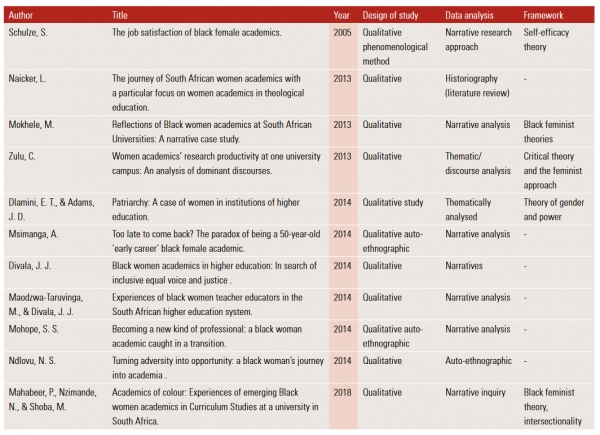Navigating the academy: The perspectives of black women academics as narrated in journal articles
Inequalities of race, gender and class continue to shape the trajectories of many South African lives post 1994. This is the case with black female researchers working in the areas of science, technology and innovation. Ncamisile Zulu and Prof. Heidi van Rooyen reviewed published articles written by black female academics to document their perspectives on navigating a career in the academic environment.

For many black female academics, getting a post-graduate degree is but the start of many challenges they still face at tertiary academic institutions. Photo: Jonathan Daniels, Unsplash
In the past two decades, the Department of Science and Technology (DST) and the National Research Foundation (NRF) have implemented various interventions to address gender and race disparities in the academic environment. Recent initiatives include the Thuthuka funding instrument, which focused on improving the capacities of younger researchers from disadvantaged groups and the South African Research Chairs Initiative, which has awarded 42 chairs to women researchers. Since 2011/2012, just over R2bn has been invested in these kinds of strategic instruments, the NRF reported.
More, but not senior
As a result, South Africa has made some progress in gender representation in the academy. HSRC data reflects a gradual increase in female epresentation from 40.8% in the 2009/2010 financial year to 44.0% in 2013/2014. However, the majority of researchers in 2013/2014 were white (46.3%). Researchers from the other population groups combined (Africans, coloureds and Indians) increased in proportion in 2013/2014 to 53.7%.
However, African female academics were the least well represented at senior levels, according to the Council on Higher Education. In 2012, they constituted 9% of the total number of female professors (662), and only 2% of all professors (2 190).
Academic experiences of black women
Literature on black women academics from South African higher education institutions was systematically searched from 1994 until June 2018 using Google Scholar. This literature was predominantly written by black women themselves, on their experiences in the academic environment.
Feeling disempowered
The analysis revealed that black women academics continued to encounter racial discrimination and gender bias in the academic space. A major challenge that appeared in 8 of the 11 papers, published between 2005 and 2018, was that of feeling disempowered. A paper written by three black women academics stated: “We experienced feelings of disempowerment rather than feelings of empowerment in the academy, despite the institutional restructuring and development agendas. The diversities of academic roles and the complexity of the workplace was disempowering, and this was further exacerbated by the imbalance between work and care-giving responsibilities.” Black women spoke about how they had to navigate maleness in the academic environment “… If you want to be in good books of these males, you must ensure that you remain less qualified than them.”
Workloads and isolation
Five articles cited heavy teaching loads as a problem, and one noted how this created a huge barrier for women’s progression in the academy… “Vuyo recalled how she started her doctorate in 2008 ‘with enthusiasm’ and thought that she would complete her studies quickly, but a teaching load of eight modules prevented this.” This issue left little time for other components of their jobs such as research and community service, and this was one of the reasons why some black women academics did not qualify for promotions.
Feelings of isolation within the academic space was narrated by four of the articles. This concern was noted mostly by younger black women academics who experienced a sense of isolation, due to the limited number of older black women academics who they could use as role models and who could help them navigate their institutions. For example, “Jeannie was not only a young black academic but rose to become a senior scholar (professor) a position that deepened the isolation. As a senior professor, not only was it difficult to interact with other colleagues in the department, but also some of the young black scholars kept a safe distance for fear of treading too closely to the Dean”.
Lack of mentoring and networks
Four of the papers mentioned lack of supportive networks as another barrier they encountered. This included a dearth of mentors and supportive and understanding leaders, especially in relation to career advancement opportunities and family responsibilities. One said, ‘Lack of professional mentoring to enhance black female academics’ confidence in research and writing for scholarly journals was a major stumbling block’.
She added that, ‘A lot of women feel they have nobody to help them’ and “those who seem knowledgeable are enemies to male leaders.” Black women academics from 2005 and even in recent years also described their dissatisfaction in terms of opportunities such as funding. They also told stories of inconsistency and lack of transparency in promotion systems: “You can meet the promotion criteria, but if you pose a threat to males you will never be promoted, instead they will ensure that they use all strategies they have at their disposal to frustrate you.”
Resilient women
Despite these challenges, some narratives of strength and success also emerged from the literature. A key characteristic of black women academics who succeeded in this environment was resilience. One black women academic recounted, “there were times when I felt isolated as a woman and as an academic, like an outsider looking in, filled with feelings of unworthiness and despair. It was within this inner space of feeling disempowered that I decided I had to establish my own agentic space for self-efficacy; challenge my fears and find my own motivations to achieve my goals, create my own support network and relationships, and balance my demanding work of managing my family, institutional and academic responsibilities.” When black women academics did succeed, strong mentors played a significant role in grooming them and helping them survive and eventually thrive in higher education.
South Africa is moving in the right direction in terms of its support of various policy instruments and interventions to address gender transformation in the academic environment. However, more in-depth, qualitative research is required to understand the barriers black women academics continue to experience. As our review shows, these challenges are experienced on many levels, from the culture, norms and values that support male advancement over that of women, to the deeply entrenched institutional practices and policies that uphold a gender bias in our academic environment.
Authors: Ncamisile Zulu, a PhD research intern in the HSRC’s Education and Skills Development research programme, and Prof. Heidi van Rooyen, executive director of the HSRC’s Human and Social Development research programme
nzulu@hsrc.ac.za hvanrooyen@hsrc.ac.za

